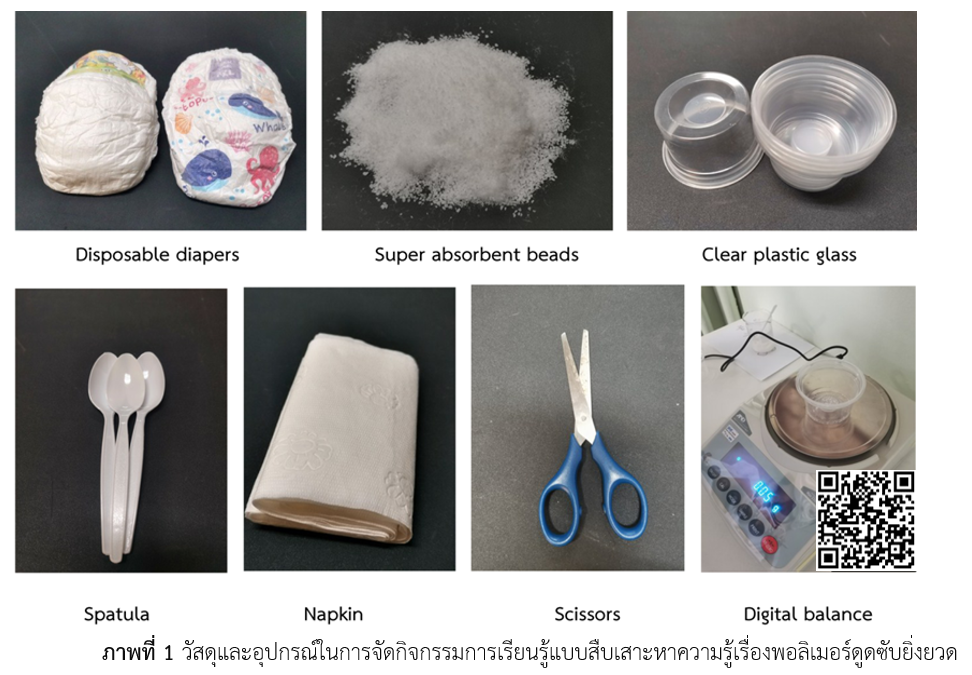การเรียนรู้แบบสืบเสาะหาความรู้เรื่องพอลิเมอร์ดูดซับยิ่งยวดสำหรับนักเรียนหลักสูตรทวิภาษาระดับชั้นมัธยมศึกษาตอนปลาย
Main Article Content
บทคัดย่อ
การเรียนรู้แบบสืบเสาะหาความรู้เป็นกระบวนการเรียนรู้หนึ่งที่สามารถนำมาใช้อย่างได้ผลในวิชาวิทยาศาสตร์ โดยมุ่งเน้นการจัดการเรียนรู้ที่เปิดโอกาสให้ผู้เรียนได้สืบเสาะหาความรู้ทางวิทยาศาสตร์ผ่านการสังเกต ตั้งคำถาม ระบุปัญหา ออกแบบวิธีการแก้ปัญหา ทดลอง และสรุปผลจากการลงมือปฏิบัติได้ด้วยตัวเองมากที่สุด ดังนั้นในบทความนี้ได้นำเสนอตัวอย่างแนวทางการจัดกิจกรรมการเรียนรู้แบบสืบเสาะหาความรู้เรื่องพอลิเมอร์ดูดซับยิ่งยวด สำหรับนักเรียนหลักสูตรทวิภาษา ระดับชั้นมัธยมศึกษาตอนปลาย โดยใช้วัฏจักรการสืบเสาะหาความรู้ทางวิทยาศาสตร์ตามแนวทางของสถาบันส่งเสริมการสอนวิทยาศาสตร์และเทคโนโลยี (สสวท.) ประกอบด้วย 5 ขั้นตอน ได้แก่ 1) มีส่วนร่วมในคำถาม 2) เก็บข้อมูลหลักฐาน 3) อธิบายสิ่งที่พบ 4) เชื่อมโยงสิ่งที่พบกับสิ่งที่ผู้อื่นพบ และ 5) สื่อสารและให้เหตุผล โดยมุ่งเน้นให้นักเรียนใช้กระบวนการสืบเสาะหาความรู้ทางวิทยาศาสตร์ในการค้นหาคำตอบด้วยการปฏิบัติด้วยตนเองด้วยประเด็นคำถามที่ว่า “ผ้าอ้อมสำเร็จรูปที่มีขายทั่วไปมีวัสดุที่เป็นพอลิเมอร์เป็นส่วนประกอบเพื่อใช้ในการดูดซับน้ำหรือของเหลวทางชีวภาพ นักเรียนจะทราบได้อย่างไรว่าผ้าอ้อมสำเร็จรูปยี่ห้อไหนมีประสิทธิภาพในการดูดซับได้ดีกว่ากัน” ผลการประเมินการเรียนรู้พบว่านักเรียนมีความเข้าใจเกี่ยวกับสมบัติพอลิเมอร์ดูดซับยิ่งยวด นอกจากนี้จากการสังเกตและสอบถามนักเรียนอย่างไม่เป็นทางการพบว่ากิจกรรมนี้ส่งเสริมให้นักเรียนมีจิตวิทยาศาสตร์ ด้านความอยากรู้อยากเห็นและกระตือรือร้น มีการใช้วิจารณญาณ มีความรอบคอบ และมีความซื่อสัตย์ นอกจากนี้กระบวนการเรียนรู้แบบสืบเสาะหาความรู้นี้สามารถส่งเสริมให้นักเรียนเกิดทักษะที่จำเป็นในการดำรงชีวิตในศตวรรษที่ 21 เช่น ทักษะการสื่อสารสารสนเทศและการรู้เท่าทันสื่อ ทักษะการคิดอย่างมีวิจารณญาณและการแก้ปัญหา และทักษะความร่วมมือ การทำงานเป็นทีมและภาวะผู้นำ
Article Details

อนุญาตภายใต้เงื่อนไข Creative Commons Attribution-NonCommercial-NoDerivatives 4.0 International License.
วารสารวิทยาศาสตร์และวิทยาศาสตร์ศึกษา (JSSE) เป็นผู้ถือลิสิทธิ์บทความทุกบทความที่เผยแพร่ใน JSSE นี้ ทั้งนี้ ผู้เขียนจะต้องส่งแบบโอนลิขสิทธิ์บทความฉบับที่มีรายมือชื่อของผู้เขียนหลักหรือผู้ที่ได้รับมอบอำนาจแทนผู้เขียนทุกนให้กับ JSSE ก่อนที่บทความจะมีการเผยแพร่ผ่านเว็บไซต์ของวารสาร
แบบโอนลิขสิทธิ์บทความ (Copyright Transfer Form)
ทางวารสาร JSSE ได้กำหนดให้มีการกรอกแบบโอนลิขสิทธิ์บทความให้ครบถ้วนและส่งมายังกองบรรณาธิการในข้อมูลเสริม (supplementary data) พร้อมกับนิพนธ์ต้นฉบับ (manuscript) ที่ส่งมาขอรับการตีพิมพ์ ทั้งนี้ ผู้เขียนหลัก (corresponding authors) หรือผู้รับมอบอำนาจ (ในฐานะตัวแทนของผู้เขียนทุกคน) สามารถดำเนินการโอนลิขสิทธิ์บทความแทนผู้เขียนทั้งหมดได้ ซึ่งสามารถอัพโหลดไฟล์บทความต้นฉบับ (Manuscript) และไฟล์แบบโอนลิขสิทธิ์บทความ (Copyright Transfer Form) ในเมนู “Upload Submission” ดังนี้
1. อัพโหลดไฟล์บทความต้นฉบับ (Manuscript) ในเมนูย่อย Article Component > Article Text
2. อัพโหลดไฟล์แบบโอนลิขสิทธิ์บทความ (Copyright Transfer Form) ในเมนูย่อย Article Component > Other
ดาวน์โหลด ไฟล์แบบโอนลิขสิทธิ์บทความ (Copyright Transfer Form)
เอกสารอ้างอิง
Institute for the Promotion of Teaching Science and Technology. (2017). Manual for basic science subject (revised edition 2017) according to the basic education core curriculum, B.E. 2551 (A.D.2008) for senior high school student (in Thai). Retrieved 15 September 2020, from SciMath: https://www.scimath.org/ebook-science/item/8415-2-2560-2551.
Justice, C., Rice, J., Roy, D., Hudspith, B., and Jenkins, H. (2009). Inquiry-based learning in higher education: administrators’ perspectives on integrating inquiry pedagogy into the curriculum. Higher Education, 58, 841-855.
Keeratichamroen, W., and Phonnong, I. (2020). A comparison of learning achievement and communication skills for undergraduate students using 5E inquiry-based learning and phenomenon-based learning (in Thai). NRRU community Research Journal, 14(1), 29-43.
Khuha, P., Panprueksa, K., Sirisawat, C., and Singlop, S. (2019). The effects of inquiry learning cycle (5Es) with concept-based instruction in photosynthesis on biological concepts and science communication abilities of the eleventh grade students (in Thai). Journal of Education Naresuan University, 21(4), 198-211.
Koocharoenpisal, N. (2017). Learning outcomes on polymer chemistry of First-Year undergraduate students through learning with programmed lesson and concept mapping (in Thai). Silpakorn University Journal, 37(3), 87-108.
Mignon, A., Vermeulen, J., Snoeck, D., Dubruel, P., Vlierberghe, S.V., and De Belie, N. (2017). Mechanical and self-healing properties of cementitious materials with pH-responsive semi-synthetic super absorbent polymers. Materials and Structures, 50(6), 1-12.
Ministry of Education. (2017). Indicators and core subject learning of Science (revised edition 2017) according to the basic education core curriculum, B.E. 2551 (A.D.2008) (in Thai). Bangkok: Printing House Agricultural Cooperatives of Thailand Ltd.
National Research Council. (1996). National science education standards. Washington, D.C.: National Academy Press.
Noiwong, W. & Phinyocheep, P. (2012). Promoting secondary students’ understanding of scientific concepts through a guided-Inquiry laboratory: Polymers and their properties. International Journal of Learning, 18(10), 327-344.
Office of the Education Council. (2017). National education plan 2017–2036 (in Thai). Bangkok: Prickwan Graphic.
Okay, O., and Sariisik, S.B. (2000). Swelling behavior of poly(acrylamide-co-sodium acrylate) hydrogels in aqueous salt solutions: theory versus experiments. European Polymer Journal, 36(2), 393-399.
Pananchai, K. and Supasorn, S. (2020). Development of grade-10 students’ conceptual understanding of ionic compound by using inquiry learning in conjunction with particulate models (in Thai). Journal of Science and Science Education, 3(2), 165-176.
Pananchai, K., Matarat, P., Tamuang, S. and Supasorn, S. (2018). Eleventh grade students’ conceptual understanding and mental models on chemical equilibrium from learning by using inquiry incorporated with predict-observe-explain technique (in Thai). Journal of Science and Science Education, 1(1), 49-60.
Partnership for 21st Century Skills. (2009). Framework for 21st century learning. Retrieved 31 May 2019, from: http://www.battelleforkids.org/networks/p21.
Polnak, P., Chauvatcharin, N., and Sirisawat, C. (2020). The study of ability in analytical thinking, biology learning achievement and attitudes toward biology of 11th grade students using the inquiry cycle (5E) instructional model with storyline (in Thai). Journal of Education Naresuan University, 22(4), 160-170.
Prompan, W., Khamhaengpol, A., and Pansuppawat, T. (2020). Comparisons of analytical thinking skills of Mathayomsuksa 6 students on the topic of polymer using the learning management based on STAD cooperative learning with POE technique and conventional instruction approach (in Thai). Journal of Humanities and Social Sciences Nakhon Phanom University, 10(2), 107-116.
Pukae, W., and Keeratichamroen, W. (2019). A study of learning achievements on polymers learning unit and analytical thinking abilities of grade 10 students by active learning with cause and effect technique (in Thai). Kasetsart Educational Review, 34(2), 11-19.
Sirum, U., Chaiso, P., Ekwarangkul, P., and Ugsonkid, S. (2020). Strategies of assessment for learning for learners in the 21st century (in Thai). Sripatum Review of Humanities and Social Sciences, 20(1), 193-206.
Sitthisarn, P. (2019). Development of teaching sets basing on guidelines on STEM education integrated with the 7 learning steps of the learning cycle (7E) on the topic of polymer for mathayom suksa 4 students (in Thai). Academic Journal of Mahamakut Buddhist University Roi Et Campus, 8(1), 108-118.
Tanan, W., and Sangsuwan, S. (2014). Super absorbent polymer: synthesis, characterization, and applications (in Thai). Journal of Science and Technology Ubon Ratchathani University, 16(2), 63-81.
Tingsa, C., Jaigla, A., Tamuang, S. and Supasorn, S. (2018). Twelfth Grade students’ achievement and problem-solving ability on properties and reactions of organic compounds from learning by using inquiry incorporated with problem-based learning (in Thai). Journal of Science and Science Education, 1(1), 97-108.
Van Schijndel, T.J.P., Jansen, B.R.J., and Raijmakers, M.E.J. (2018). Do individual differences in children’s curiosity relate to their inquiry-based learning?. International Journal of Science Education, 40(9), 996-1015.
Wongsriphuak, V. (2020). The development of group working skills for grade IV students in the learning unit of “good citizen duty actions” through Inquiry-based learning with cooperative learning (in Thai). Kasetsart Educational Review, 35(2), 181-191.


